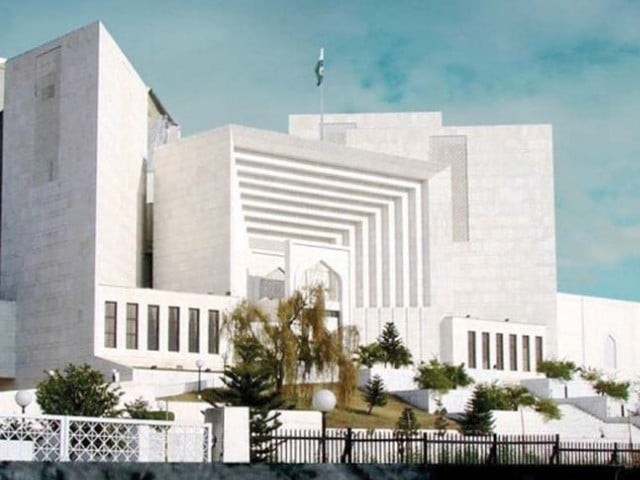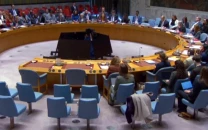SC sets guidelines for challenges to MPs’ qualification
Apex court says this remedy cannot be allowed to serve as a sword hanging over parliamentarians’ heads

PHOTO: FILE
Chief Justice of Pakistan Mian Saqib Nisar, in his 81-page verdict in Pakistan Tehreek-e-Insaf (PTI) Secretary General Jehangir Tareen’s disqualification case observed that the superior court should carefully exercise the ‘quo warranto’ jurisdiction for disqualification of elected parliamentarians.
‘Quo warranto’ is a Latin phrase which means "by what warrant?" In legal terms it means a writ formerly requiring a person to show by what authority he exercises a public office, franchise, or liberty.
The superior courts in Pakistan, while exercising the jurisdiction of ‘quo warranto’, can directly examine the qualification of any parliamentarian. Likewise, the petitioner approaches the court under same jurisdiction.
After the Panamagate case verdict, there was a fear among parliamentarians regarding the exercise of ‘quo warranto’ jurisdiction by the courts. However, the apex court in its latest judgment sets certain guidelines for the judiciary.
Tareen’s disqualification doesn’t elate Saad Rafique
The Chief Justice observed that ‘quo-warranto’ remedy should not be allowed to be a tool in the hands of the relators, who approach the court with mala fide intentions and either have their own personal grudges and scores to settle with the holder of the public office or are a proxy for someone else who has a similar object or motive.
“This remedy surely cannot be allowed to serve as a sword hanging over the heads of the Parliamentarians (members of the Provincial Assemblies) who are the chosen representatives of the people under the mandate of the Constitution (Article 2A) wherein the State shall exercise its power and authority through the chosen representatives of the people.
“Thus the Parliament is the supreme law making organ of the State; it is the supreme body to lay down the State policies. And the executive body of the State is also derived from this organ. Although the validity of legislative enactments of the Parliament, and the executive actions of the Administration (Note: which has genesis in the Parliament) are subject to the power of judicial review of the superior courts, this power should be exercised within the limits provided by the Constitution, as interpreted by the courts and the various principles of law enunciated in this behalf. Yet the sanctity of the Parliament and the Parliamentarian should not be allowed to be impinged or compromised lightly.”
According to the judgment, the ‘quo warranto’ jurisdiction should not be allowed to be used as a pressure tactic to restrain the public office-holders from performing their functions and discharging their duties in accordance with the Constitution and the law.
“This remedy of quo-warranto cannot be equated with the challenge to the holder of any other public office, which public office is statutory in nature or of an autonomous body; where the appointment is assailed as not having been made according to the law (regarding his qualifications etc.) or on account of the fact that the appointing authority lacked the authority to make such an appointment or the appointment is tainted with sheer mala fides, on the basis of political considerations, nepotism etc. and/or in utter absence and misuse of authority.
Model Town massacre: Petition seeks CM Shehbaz’s disqualification
The verdict also stresses that the courts should not lose sight of the fact that the parliamentarians are the elected representatives of the people and have come to the Parliament through a democratic process.
“Democracy is one of the basic features of the Constitution and the courts being the guardians and custodians of the Constitution are obliged to protect and safeguard the same. This relief (remedy) should not be allowed as a matter of course, the more so when the candidature of a candidate is duly scrutinised at the time of the scrutiny of his/her nomination papers to ascertain whether he is qualified or disqualified in terms of the Constitution and the law.”
Furthermore, the verdict says that after the election, his election can be challenged inter alia on the grounds of lack of qualification or disqualification before the Election Tribunal in accordance with the procedure provided by law, the the Representation of People Act, 1976 (ROPA).
The court says that the bar contained in Article 225 of the Constitution in this regard as well is another reason for using this remedy with care and circumspection. “We would not like to go further into the details of the said bar,” it says. “We are clear in our mind and view that quo warranto writ can only be issued by the Court against the Parliamentarians (members of the Provincial Assemblies) in exceptional cases.”
The judgment goes on to say the cases of the Parliamentarians cannot be considered at par with the holders of any other public office. “In the cases of Parliamentarians, the lack of qualification and disqualification is inherent in nature and if he (an unqualified or disqualified Parliamentarian) is allowed to stay as a member of the Parliament, he cannot be said to be the true and real representative of the people of his constituency as he lacks those inherent qualities and he cannot be allowed to perform his functions and discharge his duties as a trustee for the people whom he represents.
“Besides, it would be against the mandate of the qualifications and disqualifications provided by the Constitution and the law, which command has to be followed and given due effect by the courts in letter and spirit. Corruption, and anything done with dishonesty of purpose is the antithesis of honesty.”
Sharif, Maryam summoned for using official protocol despite disqualification
The court says the expression “honest” used in Article 62(1)(f) of the Constitution bears a close relation to preventing corruption. Corruption can destroy the very fabric of the state, it continues, therefore, “the power of ‘quo warranto’ in relation to the parliamentarians can be validly exercised by the courts if the disqualification attributed to them has direct and close nexus to corruption.”
For such reasons, the court says, “the bona fide and the conduct of the relator is quite significant” but at the same time the most important aspect is “whether from the grounds set out in the petition a prima facie serious case, falling within the purview of quo-warranto jurisdiction, is made out”.
“Therefore, if the grounds on the face of it are frivolous, baseless and vexatious and/or on the same grounds the election of the returned candidate was earlier challenged in appropriate proceedings before the Election Tribunal, but the plea(s) was rejected; then coupled with the conduct of the petitioner, the Court is not required to go into the merits of the case and should summarily dismiss the petition on the basis of lack of bona fides and extraneous motives of the petitioner and on account of the petition being frivolous.
“However, where on the consideration of the contents of the petition and the relevant record, the court forms an opinion that there is some substance to the matter, then, simply on account of the fact that some doubt can possibly be cast upon the conduct of the petitioner, the court shall not dismiss the petition summarily, rather it shall hear and decide the matter on merits, obviously not losing sight of the bona fides of the relator even then.”
Regarding Tareen’s case, the court observed that they are unable to agree that only because the petitioner (Hanif Abbasi) is a member of PML-N and some petition against the leader of his party head has been filed by the party head of the PTI and that this petition is subsequent in time, “therefore, it lacks bona fide or is a counterblast or as it is inaccurately stated in the petition that the name of the respondent appears in the Panama Papers, whereas it is not,” so it should be dismissed on that account.
“Especially when from the contents of the concise statement of the respondent (Jehangir Tareen) it appears that there exists an offshore company which has genesis in the respondent. And the ground in this behalf and the other grounds too are worthy of consideration at the very least. Therefore, the preliminary objection in the facts and circumstances has no force and is hereby rejected.”


















COMMENTS
Comments are moderated and generally will be posted if they are on-topic and not abusive.
For more information, please see our Comments FAQ